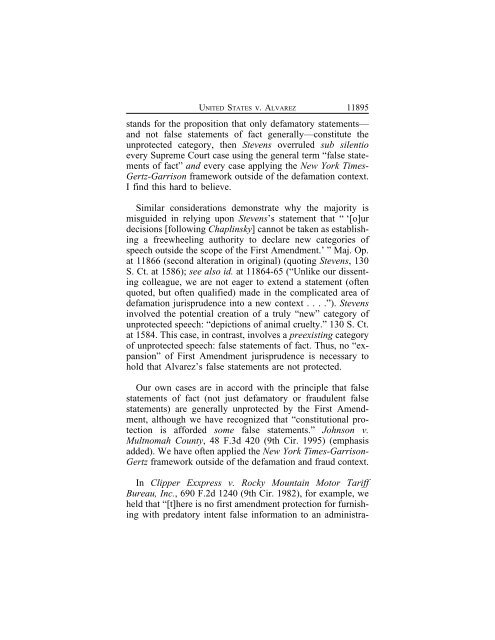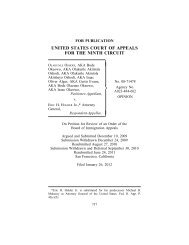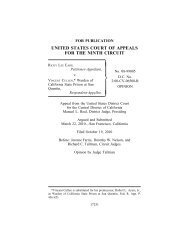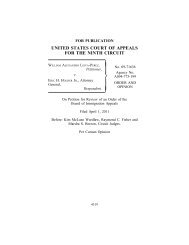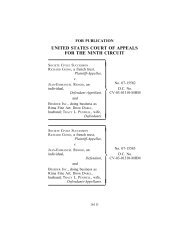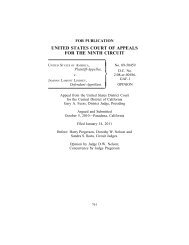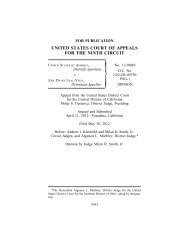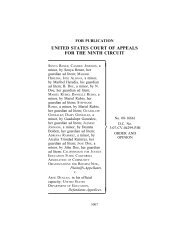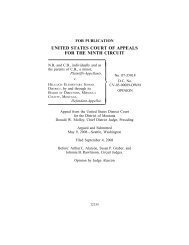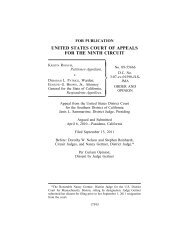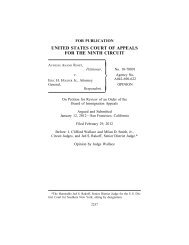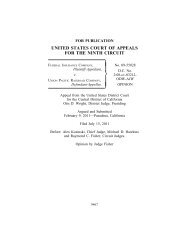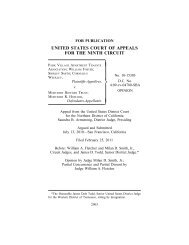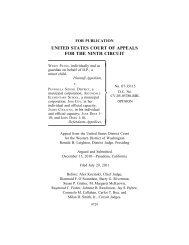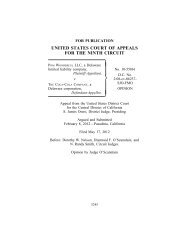USA v. Xavier Alvarez - Ninth Circuit Court of Appeals
USA v. Xavier Alvarez - Ninth Circuit Court of Appeals
USA v. Xavier Alvarez - Ninth Circuit Court of Appeals
You also want an ePaper? Increase the reach of your titles
YUMPU automatically turns print PDFs into web optimized ePapers that Google loves.
UNITED STATES v. ALVAREZ<br />
11895<br />
stands for the proposition that only defamatory statements—<br />
and not false statements <strong>of</strong> fact generally—constitute the<br />
unprotected category, then Stevens overruled sub silentio<br />
every Supreme <strong>Court</strong> case using the general term “false statements<br />
<strong>of</strong> fact” and every case applying the New York Times-<br />
Gertz-Garrison framework outside <strong>of</strong> the defamation context.<br />
I find this hard to believe.<br />
Similar considerations demonstrate why the majority is<br />
misguided in relying upon Stevens’s statement that “ ‘[o]ur<br />
decisions [following Chaplinsky] cannot be taken as establishing<br />
a freewheeling authority to declare new categories <strong>of</strong><br />
speech outside the scope <strong>of</strong> the First Amendment.’ ” Maj. Op.<br />
at 11866 (second alteration in original) (quoting Stevens, 130<br />
S. Ct. at 1586); see also id. at 11864-65 (“Unlike our dissenting<br />
colleague, we are not eager to extend a statement (<strong>of</strong>ten<br />
quoted, but <strong>of</strong>ten qualified) made in the complicated area <strong>of</strong><br />
defamation jurisprudence into a new context . . . .”). Stevens<br />
involved the potential creation <strong>of</strong> a truly “new” category <strong>of</strong><br />
unprotected speech: “depictions <strong>of</strong> animal cruelty.” 130 S. Ct.<br />
at 1584. This case, in contrast, involves a preexisting category<br />
<strong>of</strong> unprotected speech: false statements <strong>of</strong> fact. Thus, no “expansion”<br />
<strong>of</strong> First Amendment jurisprudence is necessary to<br />
hold that <strong>Alvarez</strong>’s false statements are not protected.<br />
Our own cases are in accord with the principle that false<br />
statements <strong>of</strong> fact (not just defamatory or fraudulent false<br />
statements) are generally unprotected by the First Amendment,<br />
although we have recognized that “constitutional protection<br />
is afforded some false statements.” Johnson v.<br />
Multnomah County, 48 F.3d 420 (9th Cir. 1995) (emphasis<br />
added). We have <strong>of</strong>ten applied the New York Times-Garrison-<br />
Gertz framework outside <strong>of</strong> the defamation and fraud context.<br />
In Clipper Exxpress v. Rocky Mountain Motor Tariff<br />
Bureau, Inc., 690 F.2d 1240 (9th Cir. 1982), for example, we<br />
held that “[t]here is no first amendment protection for furnishing<br />
with predatory intent false information to an administra-


